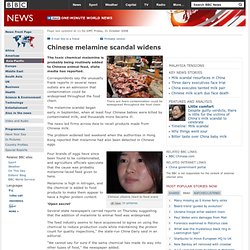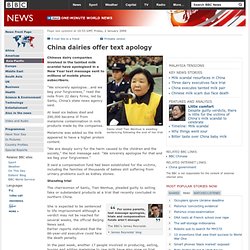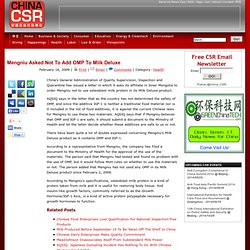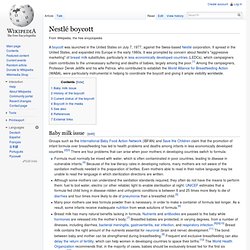

Chinese melamine scandal widens. The toxic chemical melamine is probably being routinely added to Chinese animal feed, state media has reported.

Correspondents say the unusually frank reports in several news outlets are an admission that contamination could be widespread throughout the food chain. The melamine scandal began early in September, when at least four Chinese babies were killed by contaminated milk, and thousands more became ill. The news led firms across Asia to recall products made from Chinese milk. The problem widened last weekend when the authorities in Hong Kong reported that melamine had also been detected in Chinese eggs. Four brands of eggs have since been found to be contaminated, and agriculture officials speculate that the cause was probably melamine-laced feed given to hens. Melamine is high in nitrogen, and the chemical is added to food products to make them appear to have a higher protein content. 'Open secret' China dairies offer text apology. Chinese dairy companies involved in the tainted milk scandal have apologised in a New Year text message sent to millions of mobile phone subscribers.

"We sincerely apologise...and we beg your forgiveness," read the note from 22 dairy firms, led by Sanlu, China's state news agency said. At least six babies died and 290,000 became ill from melamine contamination in milk products made by the companies. Melamine was added so the milk appeared to have a higher protein content. "We are deeply sorry for the harm caused to the children and the society," the text message said.
"We sincerely apologise for that and we beg your forgiveness. " It said a compensation fund had been established for the victims, including the families of thousands of babies still suffering from urinary problems such as kidney stones. Standing trial The chairwoman of Sanlu, Tian Wenhua, pleaded guilty to selling fake or substandard products at a trial that recently concluded in northern China. Parents' protests. Mengniu Asked Not To Add OMP To Milk Deluxe - ChinaCSR.com - Cor. China's General Administration of Quality Supervision, Inspection and Quarantine has issued a letter in which it asks its affiliate in Inner Mongolia to order Mengniu not to use osteoblast milk protein in its Milk Deluxe product.

AQSIQ says in the letter that as the country has not determined the safety of OMP, and since the additive IGF-1 is neither a traditional food material nor is it included in the list of food additives, it is against the current Chinese laws for Mengniu to use these two materials. AQSIQ says that if Mengniu believes that OMP and IGF-1 are safe, it should submit a document to the Ministry of Health and let the latter decide whether these additives are safe to us or not. There have been quite a lot of doubts expressed concerning Mengniu's Milk Deluxe product as it contains OMP and IGF-1. According to a representative from Mengniu, the company has filed a document to the Ministry of Health for the approval of the use of the materials. Loading ... Hong Kong markets pull Nestle milk powder - Food safety- msnbc.c.
Nestlé boycott. A boycott was launched in the United States on July 7, 1977, against the Swiss-based Nestlé corporation.

It spread in the United States, and expanded into Europe in the early 1980s. It was prompted by concern about Nestlé's "aggressive marketing" of breast milk substitutes, particularly in less economically developed countries (LEDCs), which campaigners claim contributes to the unnecessary suffering and deaths of babies, largely among the poor.[1] Among the campaigners, Professor Derek Jelliffe and his wife Patrice, who contributed to establish the World Alliance for Breastfeeding Action (WABA), were particularly instrumental in helping to coordinate the boycott and giving it ample visibility worldwide.
Baby milk issue[edit] History of the boycott[edit] Nestlé's marketing strategy was first written about in New Internationalist magazine in 1973 and in a booklet called The Baby Killer, published by the British NGO War On Want in 1974. Current status of the boycott[edit] See also[edit] Welcome Nestlé Baby Milk Issue Facts Infant Formula Benefits of. Welcome Nestlé Baby Milk Issue Facts Infant Formula Benefits of. Nestlé Creating Shared Value Report 2007. All About us – Dumex.